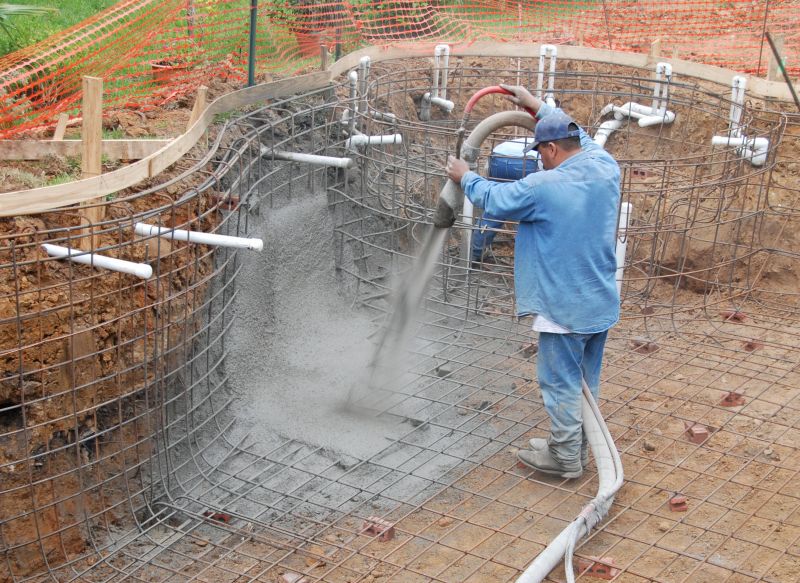Favorite Products For Gunite Pool Repair Projects
Choose from trusted products that simplify the repair process and improve your pool’s durability and appearance.
 Maintaining the integrity of a gunite pool requires careful attention to repairs and maintenance over time. When issues such as cracks, surface deterioration, or leaks arise, selecting the appropriate repair products becomes essential. These products are designed to restore the pool's structural soundness and aesthetic appeal, ensuring safe and enjoyable swimming experiences. Repairing gunite pools involves a variety of solutions, from patching surface cracks to full resurfacing, each suited to different types of damage and pool conditions.
Maintaining the integrity of a gunite pool requires careful attention to repairs and maintenance over time. When issues such as cracks, surface deterioration, or leaks arise, selecting the appropriate repair products becomes essential. These products are designed to restore the pool's structural soundness and aesthetic appeal, ensuring safe and enjoyable swimming experiences. Repairing gunite pools involves a variety of solutions, from patching surface cracks to full resurfacing, each suited to different types of damage and pool conditions.
Top Overall Option
Epoxy Pool Repair Kit
An epoxy-based repair kit offers a versatile solution for sealing cracks, patching chips, and restoring damaged surfaces in gunite pools. Known for its strong adhesion and flexibility, epoxy can be used on various pool surfaces and withstand constant water exposure. Proper application involves thorough cleaning and surface preparation, ensuring a durable and lasting repair. This type of product provides a comprehensive option for both minor and moderate repairs, making it a popular choice among pool owners seeking reliable results.
Types of Products For Gunite Pool Repairs
Epoxy Repair Compounds
Used for sealing cracks and patching damaged areas with strong adhesion and flexibility.
Cementitious Resurfacing Mixes
Designed for restoring the pool surface with durable, plaster-like finishes.
Polyurethane Sealants
Flexible sealants ideal for sealing leaks and small cracks in pool surfaces.
Pool Plaster Patches
Pre-mixed patches for repairing surface chips and minor damage.
Resurfacing Overlays
Thin coatings that can be applied over existing surfaces to improve appearance and protection.
Bonding Agents
Used to enhance adhesion between old and new repair materials.
Leak Detection Dyes
Assist in identifying leaks before performing repairs.
Acid Wash Solutions
Prepare surfaces for repair by cleaning and etching.
Fiberglass Patches
Reinforce structural repairs with fiberglass cloth and resin.
Pool Paints
Color coatings designed for pool surfaces to improve appearance and protection.
Bonding Primers
Improve adhesion of repair materials to existing surfaces.
Flexible Repair Tape
Temporary or semi-permanent solutions for small leaks and cracks.
Grout and Caulking
Fill joints and small cracks around tiles and fittings.
Resin Coatings
Provide a protective layer over repaired areas for added durability.
Surface Cleaners
Ensure proper surface preparation before applying repair products.
Popular Choices
Widely used for sealing cracks and small leaks with ease of application.
Complete kits for restoring the pool surface with minimal fuss.
Popular for sealing leaks in various pool surfaces with flexibility.
Convenient options for quick surface repairs without mixing.
Applied over existing surfaces for aesthetic and protective benefits.
Effective for reinforcing structural repairs in damaged areas.
Popular for refreshing the pool's appearance and adding a protective layer.
Enhance adhesion of repair materials to existing surfaces.
Commonly used to identify leaks before repairs.
Popular for sealing joints and small cracks around fittings.
Regularly used to prepare surfaces for effective repairs.
The process begins with assessing the extent of damage, which guides the selection of repair materials. Surface cracks and minor chips can often be addressed with patching compounds, while larger structural issues might require more extensive resurfacing or reinforcement. Proper preparation, including cleaning and surface roughening, is vital for optimal adhesion of repair products. Additionally, choosing products that are compatible with existing pool finishes and materials helps ensure a seamless repair that withstands water exposure and pool use.
Advancements in pool repair technology have introduced various formulations and application methods. Epoxy and polyurethane-based products are common for sealing leaks and cracks, offering flexibility and durability. Cementitious repair compounds are frequently used for resurfacing or patching larger areas, providing a robust and long-lasting finish. For aesthetic purposes, color-matched patching compounds and overlays can help blend repairs with the existing pool surface. Properly selected and applied repair products can extend the lifespan of a gunite pool and reduce the need for costly replacements.
Ultimately, selecting the right repair products depends on the specific damage, pool conditions, and desired longevity of the repair. Consulting with pool maintenance professionals or thoroughly researching product options can help pool owners make informed decisions. Regular inspections and timely repairs are key to maintaining the pool's structural integrity and visual appeal, helping to preserve the investment in a gunite pool for years to come.
Key Buying Considerations
- Identify the specific type and extent of damage to determine suitable repair products.
- Compatibility of repair materials with existing pool surfaces and finishes.
- Ease of application and required surface preparation steps.
- Durability and flexibility of the repair product to withstand pool conditions.
- Curing time and how it fits into your maintenance schedule.
- Water resistance and ability to withstand constant submersion.
- Color matching options for aesthetic repairs.
- Availability of repair kits versus individual components.
- Long-term performance and resistance to pool chemicals.
- Cost-effectiveness relative to the size and scope of repairs.
- Manufacturer instructions and recommended safety precautions.
- Environmental conditions that may affect repair longevity.
- Professional assistance versus DIY repairs based on complexity.
- Warranty or satisfaction guarantees offered by the product.
- Reviews and ratings from other pool owners.
